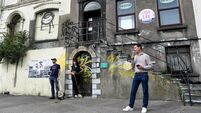Vaccine Trials: Dark chapter that needs answers
IN June 2014, media reports which became the subject of public discussion revealed Burroughs Wellcome-sponsored vaccine trials in Ireland were far more widespread, and were undertaken over a much longer period than was previously known.
Further investigations now reveal that a systematic series of Wellcome-sponsored vaccine trials were conducted in children’s institutions over a period of almost 50 years from 1930 to 1977, sanctioned and overseen by state-salaried medical officers and academics.















